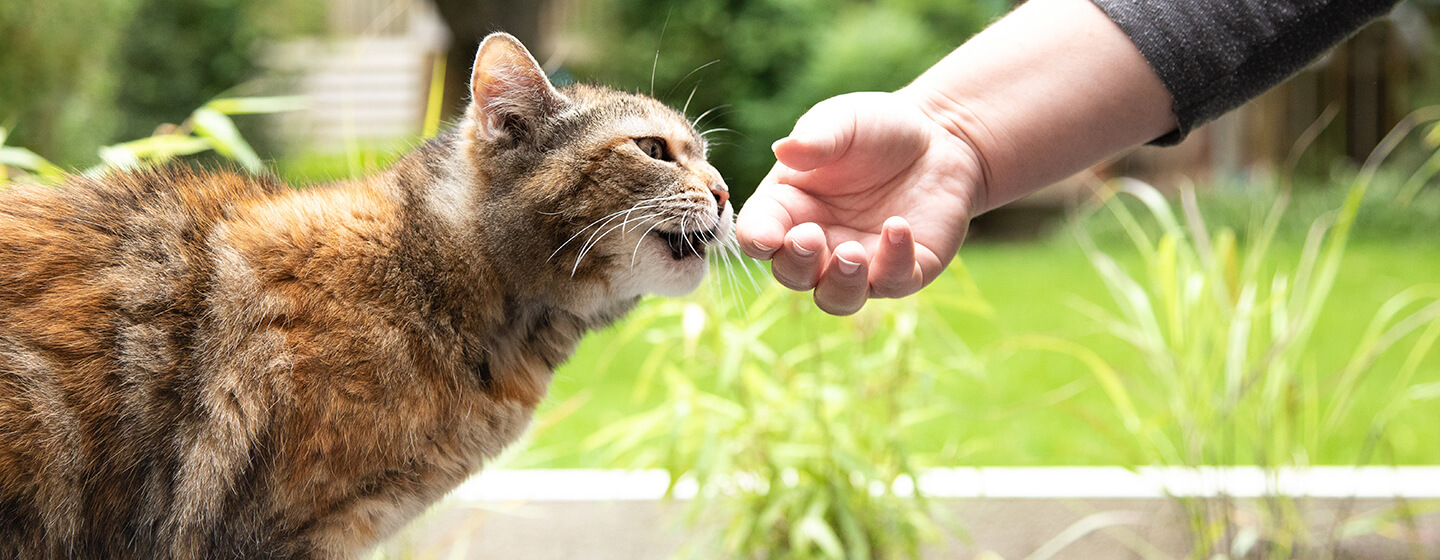
Cats are independent creatures with no particular desire to get in your good graces, but they are also incredibly intelligent and ready to learn various behaviours if a good reward is waiting for them.
This is exactly what cat clicker training is based on. Read on to find out more about this method of training your cat.
What is cat clicker training?
Cat clicker training is a fast and easy way to shape your cat's behaviour and even teach them a few useful tricks. A small plastic clicker device is used to identify the good behaviour you want your cat to learn. The clicking sound is immediately followed by a special cat treat rewarding the feline for performing well.
The most important part of the cat clicker training routine is the sequence ‘click and reward’. This will help the cat associate particular actions with favourable consequences which is how good behaviour is ultimately learned.
Why use a clicker for cat training?
There are a few reasons why using a clicker is more effective that just voice commands. A human voice doesn’t sound the same every time as mood or circumstances can change your pitch or intonation, making your voice inconsistent and therefore unreliable as a signal for cat training.
The voice command also takes longer to complete. Your cat doesn’t usually stick around to listen to what you have to say, even if it’s you praising them. A clicker gives a quick signal you can easily synchronise to the good deed.
What treats to use for cat clicker training?
Effective cat clicker training precisely pinpoints the good behaviour so that the cat can immediately associate it with the treat. Choose a delicious healthy treat that is easy to carry and fast for your cat to eat. Take into consideration the extra calories you will be adding to the daily intake to make sure you manage their weight appropriately. Kibble is very convenient to use as it’s probably already part of your cat’s diet. Just feed them part as a main meal and the remaining part can be used as training treats.
How does cat clicker training work?
Cat clicker training is based on the idea of creating positive associations. Have your cat’s favourite treat handy and as soon as they complete the requested action, click the clicker and give them the treat. Repeat several times until they start expecting the treat as soon as they hear the click. This is when the association process is complete and you can move on to using targets.
Place a target stick close to your cat and let them sniff it. As soon as they do so, click and give them a treat. Keep moving the target further away to make them follow it. After a few days you can start to add a cue word as well. For example, as your cat is approaching the end of the stick, say ‘sniff’, then click and reward. After a few repetitions over a couple of weeks, you will notice the word cue will be enough to spur your cat into action. You can slowly stop using the clicker altogether and even begin to give treats sparsely.
What tricks to teach using cat clicker training?
Use cat clicker training to teach your cat to sit. This is a good starting point and often a building block for teaching them other skills such as standing on their behind legs.
Wouldn’t you want to get high fives from your favourite pet every day? Cat clicker training can help you do that as well. When it comes to choosing the cue word make sure it’s ‘high five’ and watch as all your friends are impressed by your cat training skills at your next dinner party.
As demonstrated by the countless cat videos online, cats can fetch too.
Grab your clicker, some treats, a ball that fits into your cat’s mouth and start clicker training. Build their skills up gradually by teaching them to touch the ball at first, then to grab the ball and ultimately to bring it back to you.
Top tips for cat clicker training
- Check your cat’s reaction to the sound of the click before you begin training. Some cats might not like the clicking noise or find it frightening.
- Follow the click with a treat every time, even if you clicked at the wrong moment. This will help create a strong link in your cat’s brain between the sound and the reward.
- If you find your cat is not very interested in click training, the treat might not be delicious enough to warrant the effort. Try a few different ones until they start to pay attention.
- Don’t speak during the click-treat routine otherwise the cat might get confused. Let the click be the only signal they hear in that moment.
For more information on teaching your cat new things, read our guide to litter-training your cat.











